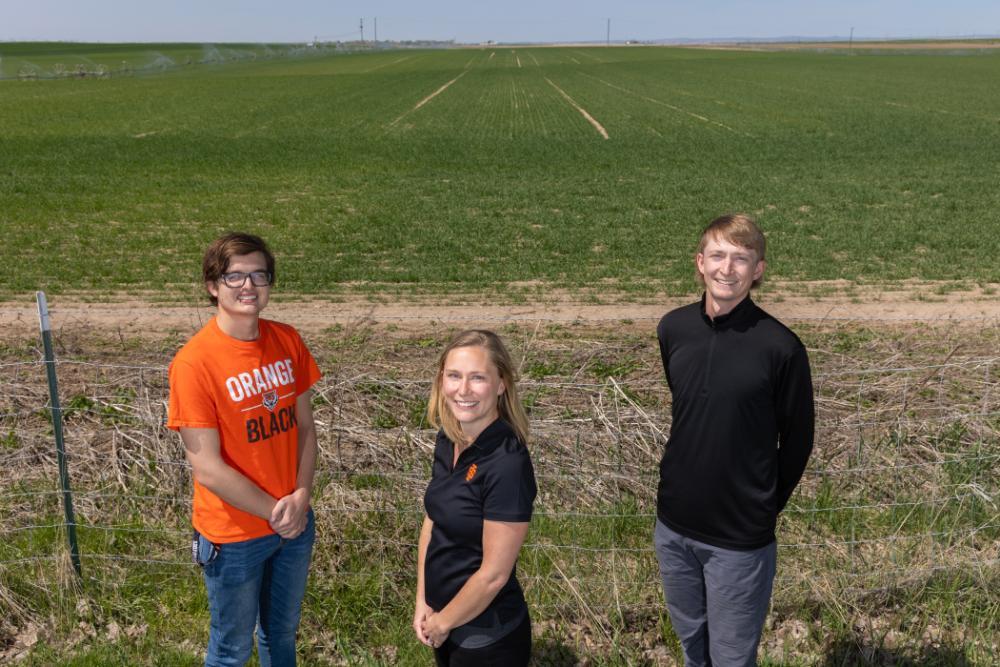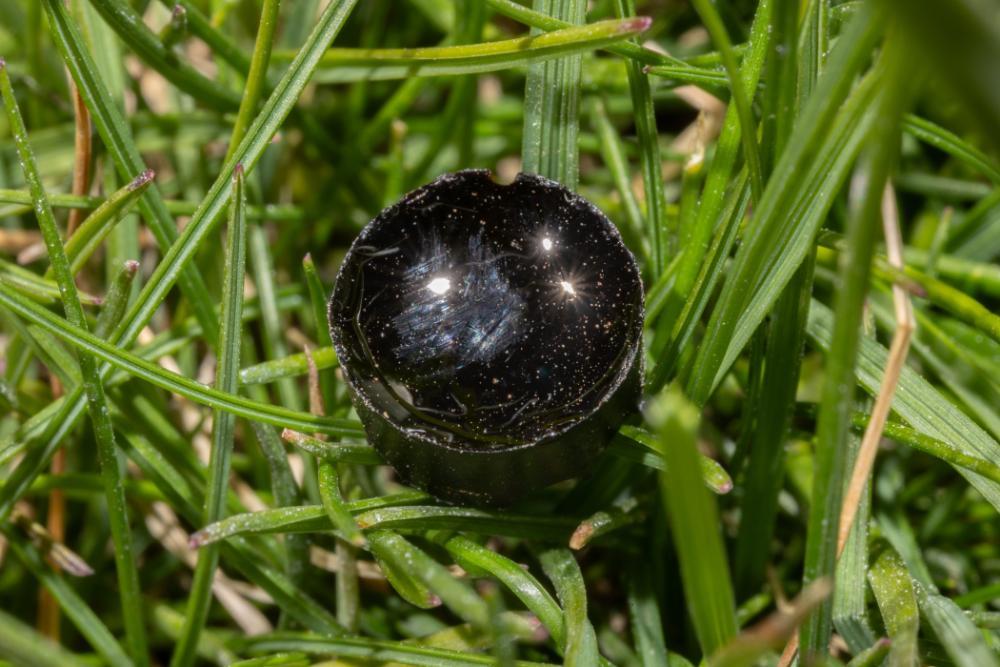From Rejection to Redemption: Idaho State Prof. Awarded NSF CAREER Grant to Develop Next-Gen Fertilizers
May 23, 2024

When Cori Jenkins received an email rejecting a research proposal she had spent countless hours drafting, to say she was disappointed would be an understatement.
The funding Jenkins had her eyes on was a National Science Foundation Faculty Early Career Development (CAREER) award. This grant is among the most distinguished offered by the agency and is a coveted prize for university faculty near the beginning of their research career.
“The proposal was to take industrial byproducts and create polymers that could be used to remove metals from waterways,” said Jenkins, an associate professor of chemistry at Idaho State University. “Once the polymers had done their work, we’d use bacteria to break down the polymer and remove the waste metals.”
“I regret to inform you that the National Science Foundation is unable to support your proposal,” read the words on her screen. The email was a researcher’s equivalent to a “Dear John,” and her idea—and its funding request—was being rejected. Being rebuffed by an agency or organization is pretty standard in the academic sphere. Even so, the feedback she received was especially harsh.
“One reviewer said the proposal was ‘neither interesting nor novel,’” Jenkins explained. “I spoke to the NSF Program Officer—the person helping make recommendations—and they explained there was no way it would be funded with small changes. For a CAREER award, the NSF is looking for something that will launch your career in a totally new direction.”
Jenkins is an expert when it comes to sulfur-based chemistry. In her Pocatello-based lab, Jenkins and her students work to combine elemental sulfur—a by-product of oil refining, natural gas production, and metal smelting—with other molecules to create new substances. The process is called inverse vulcanization, which sees them combining the foul-smelling element with monomers to form polymers. Monomers are small molecules that can be combined to form a large chain of molecules called a polymer. You probably know polymers by their more common name: plastics. In the last few years, the lab has created polymers that can detect and remove precious metals from wastewater and serve as adhesives.
“The chemistry you can do with sulfur is so different from what you can do with any other element,” Jenkins said. “Sulfur takes many forms, and that changes how it can interact with other substances.”
“Most of the research in our lab deals with synthesizing sulfur-based polymers from sulfur waste generated by the petroleum industry, and I find it pretty cool that we take ‘waste’ and convert it to materials with relevant uses in society,” said Cal Norby, a graduate student from Pocatello. “Dr. Jenkins does a fantastic job of granting her students the freedom to experiment and solve research problems independently while still guiding the direction of each project in a way that maximizes the productivity of our lab.”
Post-rejection, Jenkins went to work mulling over ways to improve her proposal. She came across a single paper that focused on using sulfur-based polymers as a way to deliver traditional fertilizers to crops.
“I feel like this idea has been under-explored but has a lot of potential,” Jenkins said.
With her eyes turned toward the agricultural applications for sulfur and polymers, she was in the ag-focused talks at the American Chemical Society’s Spring 2023 meeting in Indianapolis, Indiana. The number one issue she heard: water. Farmers are always looking for ways to get more yield out of every square inch of available soil, and to do that means the crops themselves need more water at the ready when they need a drink.

A sulfur-based hydrogel developed by Cori Jenkins, an associate professor of chemistry at Idaho State University.
During a conversation with one of the presenters, Jenkins also heard about how farmers were now having to apply sulfur to their crops. Sulfur is an essential nutrient for plants, and as the world is switching from burning fossil fuels to renewable energy sources, less and less sulfur is in the air, and less and less is being deposited to the soil via rain. It is a good problem to have—less sulfur in the atmosphere means cleaner air for the world to breathe—but it is an issue for farmers because less sulfur means lower crop yields. The two ideas combined—the need for water and the need for sulfur—struck like a lightning bolt in Jenkins's mind.
“I thought, ‘That’s us,’” said Jenkins. “I was in the hotel lobby, and I immediately started writing down questions I needed to find answers to, such as how sulfur chemistry works in plants and how plants access sulfur. It was the best four hours I’ve had at a conference.”
Back in Pocatello, Jenkins got to work. Her starting point was the polymers from her rejected proposal. Called hydrogels, these are polymers that can absorb water.
“Hydrogels are common,” Jenkins said. “The absorbent part of diapers, expandable water toys like Orbeez, and contact lenses are all types of hydrogels, to name a few.”
The departure from her old iteration was how those hydrogels would be used. Jenkins was now proposing to create a sulfur-based hydrogel that could be used as a Swiss Army Knife of fertilizer for crops by providing the much-needed water and sulfur. Part of the rub for making sulfur-based hydrogels is that sulfur is hydrophobic, so it doesn’t mix with water easily. If you’ve tried mixing oil and water, you’ve seen a hydrophobic substance in action. In her lab, Jenkins has been able to have some success in creating sulfur-based hydrogels with varying amounts of the element, but the added wrinkle is getting the sulfur concentration into the Goldilocks zone with all their other considerations.
“We want the hydrogels to absorb water quickly but release it slowly, and the amount of sulfur needs to be what the plants need,” said Jenkins. “Plus, we need to make sure that the hydrogels won’t harm the beneficial bacteria in the soil.”
Again, Jenkins set her sights on the National Science Foundation’s CAREER award for her reformulated idea. On paper, submissions were due in July. However, Jenkins was working on her own expedited timeline due to the expected arrival of her second child.
“I told people the grant is due when the baby is due,” Jenkins said. “Thankfully, we had everything 99.99 percent done before my due date.”
So, after a fast and furious few months of writing and rewriting and the birth of a baby girl in June, Jenkins hit send on the new proposal in July 2023.
“I felt good about it,” Jenkins said.
The review process takes time, and six months later, over ISU’s holiday break, jackpot. “Congratulations! Receiving this notice indicates that your proposal, 2337376 - CAREER: Introducing Dynamic Sulfur Chemistry into Hydrogels to Promote Water Retention and Healthy Microbe Growth in Soil - has been recommended for funding by the Division of Materials Research,” said the email to Jenkins from the NSF. She joins two other Idaho State University researchers who’ve received the award in the past seven years. Sarah Godsey, associate professor in the Department of Geosciences, received one in 2017. Meanwhile, Devaleena Pradhan, associate professor in the Department of Biological Sciences, was awarded her’s in 2022.
“It was nap time at my house when I got the email. My husband and two kids were asleep, and I was there freaking out with no one to tell,” said Jenkins. “I was ecstatic.”
"We’re incredibly proud of Dr. Jenkins,” said Joshua Pak, professor and chair of the chemistry department at Idaho State University. “In addition to conducting research projects that have the potential to support a more sustainable world through green chemistry, she is a great role model for our students, providing them with exceptional opportunities and setting them up for success at Idaho State and in their careers."
Beyond exploring the possibilities of sulfur-based hydrogels, her award also includes a portion of funding to establish a summer program for all research students in the Department of Chemistry focusing on science communication. The budding chemists will learn how to explain the technical side of their work to fellow scientists and simplify their work to a level the public can understand.
“It’s become essential for students and researchers to be able to explain their work,” Jenkins said. “You need to be able to explain why what you are doing is interesting, exciting, and matters to the world.”
All told, her idea has been funded for five years and $590,781. Looking back, Jenkins finds that her initial rejection and four hours in Indianapolis were fortuitous for her career.
“The best thing that happened was being rejected because it forced me to push myself out of my comfort zone,” Jenkins said. “And if we get these sulfur-based hydrogels to work, it will open up sulfur chemistry to a wide range of new uses and ideas.”
For more information on ISU’s Department of Chemistry, visit isu.edu/chem.
To schedule a campus tour, visit isu.edu/visit.
Categories:
